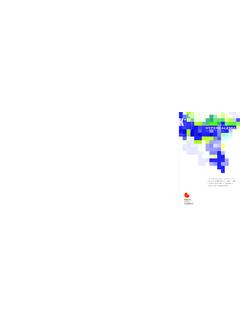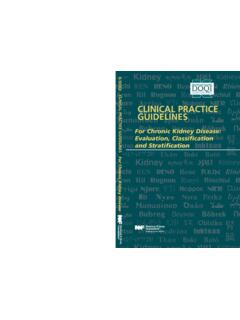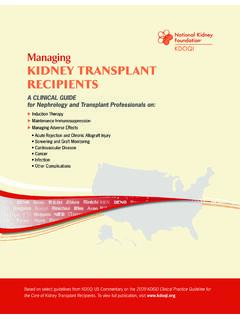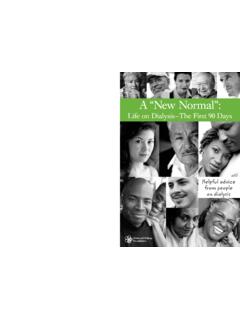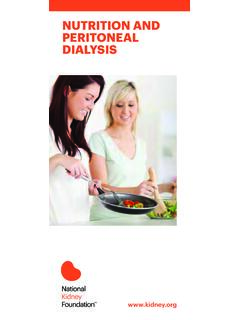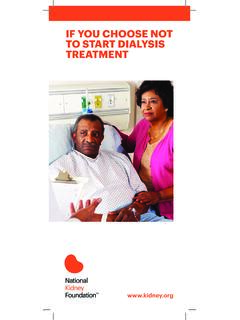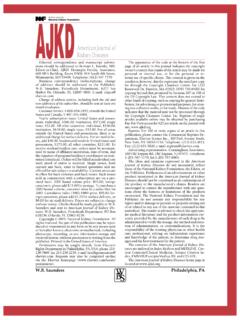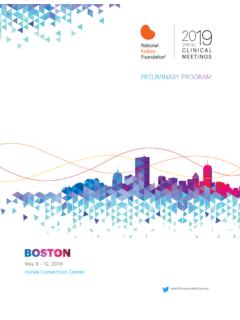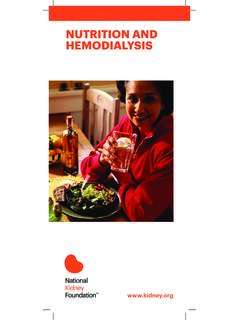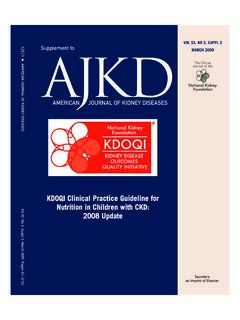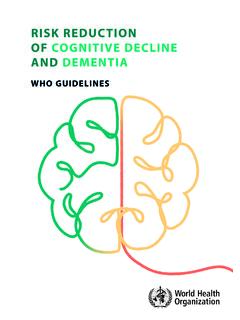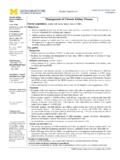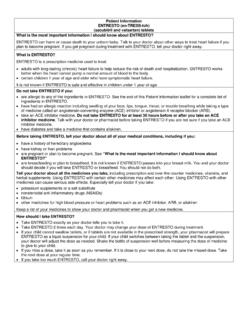Transcription of HIGH BLOOD PRESSURE AND YOUR KIDNEYS
1 HIGH BLOOD . PRESSURE AND. YOUR KIDNEYS . About the Information in this Booklet Did you know that the National Kidney (NKF). Foundation offers guidelines and commentaries that help your healthcare provider make decisions about your medical treatment? The information in this booklet is based on those recommended guidelines. Stages of Kidney Disease There are five stages of kidney disease. They are shown in the table below. Your healthcare provider determines your stage of kidney disease, based on the presence of kidney damage and your glomerular filtration rate (GFR), which is a measure of your kidney function.
2 Your treatment is based on your stage of kidney disease. Speak to your healthcare provider if you have any questions about your stage of kidney disease or your treatment. STAGES OF KIDNEY DISEASE. Glomerular Stage Description Filtration Rate (GFR)*. Kidney damage ( , protein 1 90 or above in the urine) with normal GFR. Kidney damage with mild 2 60 to 89. decrease in GFR. 3 Moderate decrease in GFR 30 to 59. 4 Severe reduction in GFR 15 to 29. 5 Kidney failure Less than 15. *Your GFR number tells your healthcare provider how much kidney function you have.
3 As chronic kidney disease progresses, your GFR number decreases. About 73 million Americans have high BLOOD PRESSURE , but as many as one-third or three in 10 don't even know it. There are usually no signs or symptoms that your BLOOD PRESSURE is too high. That is why it is important to have your BLOOD PRESSURE checked on a regular basis, especially if you have a family history of the disease or are at risk for other reasons. (See What causes high BLOOD PRESSURE ? on page 6.). Do you know these facts about high BLOOD PRESSURE ?
4 It is called a silent killer because you can have it for years without knowing it. It is a leading cause of heart attacks, strokes, and chronic kidney disease. Controlling high BLOOD PRESSURE reduces the risk of these complications. High BLOOD PRESSURE can often be controlled by losing excess weight, exercising more, not smoking, and cutting down on salt. What is BLOOD PRESSURE ? BLOOD PRESSURE is measured with a BLOOD PRESSURE cuff that is wrapped around your upper arm. The person taking your BLOOD PRESSURE (you can learn to do it yourself) pumps air into the cuff and then slowly lets it out while listening for the sound of your pulse.
5 The top number in your BLOOD PRESSURE reading is called the systolic PRESSURE and the bottom number is called the diastolic PRESSURE . For example, a reading might be 120/80, which is said as 120 over 80. The top number is the PRESSURE when your heart beats. The bottom number is the PRESSURE when your heart rests between beats. What is high BLOOD PRESSURE ? High BLOOD PRESSURE (also known as hypertension) occurs when the force of your BLOOD against your artery walls increases enough to cause damage. A single high reading may not mean that you have high BLOOD PRESSURE .
6 A diagnosis of high BLOOD PRESSURE should always be confirmed on follow- up visits to your healthcare provider or clinic. Normal BLOOD PRESSURE is below 120/80. For most adults, high BLOOD PRESSURE is defined by a systolic PRESSURE (top number) of 140 or higher 4 NATIONAL KIDNEY FOUNDATION. and/or a diastolic PRESSURE (bottom number) of 90 or higher. People who have systolic BLOOD PRESSURE of 120 . 139 or diastolic BLOOD PRESSURE of 80 . 89 are said to have pre-hypertension. They should speak to their healthcare providers about lifestyle changes that can help them prevent high BLOOD PRESSURE .
7 If you have diabetes, chronic kidney disease, a kidney transplant, or if you are older than 65, ask your healthcare provider what your target BLOOD PRESSURE should be. 5. What causes high BLOOD PRESSURE ? The exact causes of high BLOOD PRESSURE are not known in most cases. However, your chances of developing high BLOOD PRESSURE may be increased if you: have a family history of high BLOOD PRESSURE have chronic kidney disease are overweight are Black American use a lot of table salt; eat a lot of packaged and fast foods use birth control pills have diabetes use illegal drugs drink large amounts of alcohol (beer, wine, or liquor).
8 Up until age 45, men are more likely to have high BLOOD PRESSURE than women. Between ages 45 and 54, the risk is similar. After age 54, more women than men have high BLOOD PRESSURE . 6 NATIONAL KIDNEY FOUNDATION. How can high BLOOD PRESSURE hurt my body? Untreated high BLOOD PRESSURE can damage your heart, brain, eyes, and KIDNEYS . This damage can lead to heart attacks, strokes, and kidney failure. If you also have diabetes, your chance of developing these other conditions is even greater. For this reason, it is important to keep your BLOOD sugar under control and follow your healthcare provider's advice carefully.
9 (See How is high BLOOD PRESSURE treated? on page 10.). How are Black Americans affected by high BLOOD PRESSURE ? High BLOOD PRESSURE is a major health problem among Black Americans. Not only do Black Americans have a greater rate of high BLOOD PRESSURE than White Americans, but they also tend to develop high BLOOD PRESSURE at an earlier age and more severely. As a result, Black Americans have a higher rate of strokes, heart disease, and kidney failure. Black Americans should have regular BLOOD PRESSURE checkups and, if high BLOOD PRESSURE is detected, they should follow their healthcare provider's advice carefully.
10 (For more information about Black Americans and high BLOOD PRESSURE , see the National 7. Kidney Foundation's brochure Winning the Fight Against Silent Killers: A Guide for Black Americans.). How often should I have my BLOOD PRESSURE checked? Your BLOOD PRESSURE should be checked at least once a year and any time you see your healthcare provider. If it is too high, you should have it checked as often as your healthcare provider advises. You may need to start taking medication if your PRESSURE remains high. Your healthcare provider may also ask you to check your BLOOD PRESSURE at home on a regular basis.
